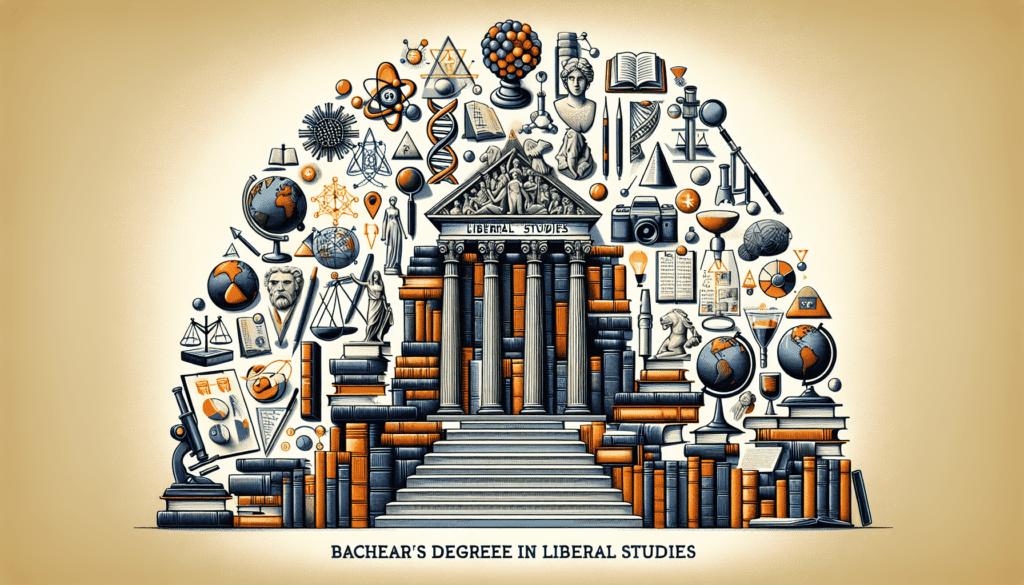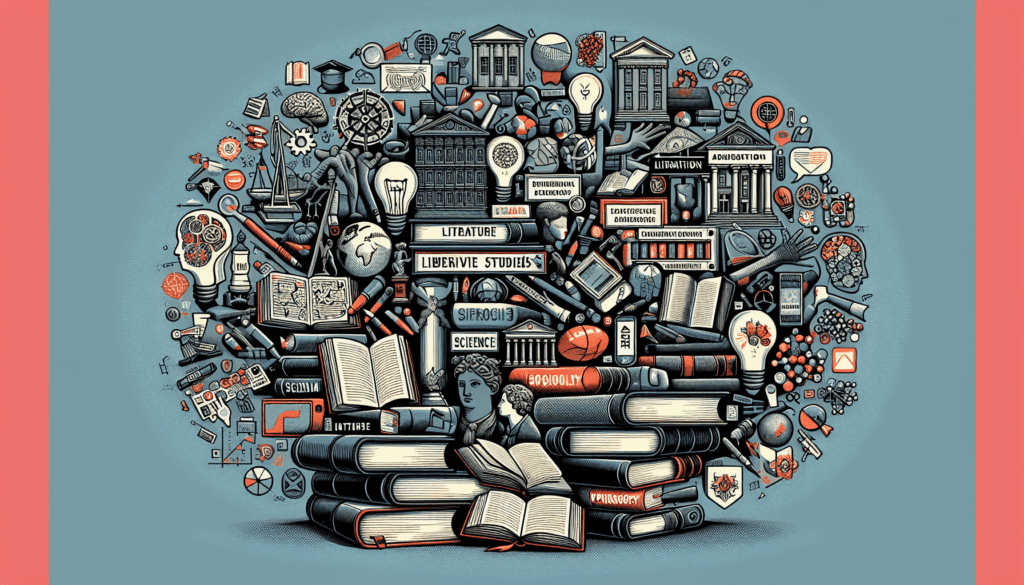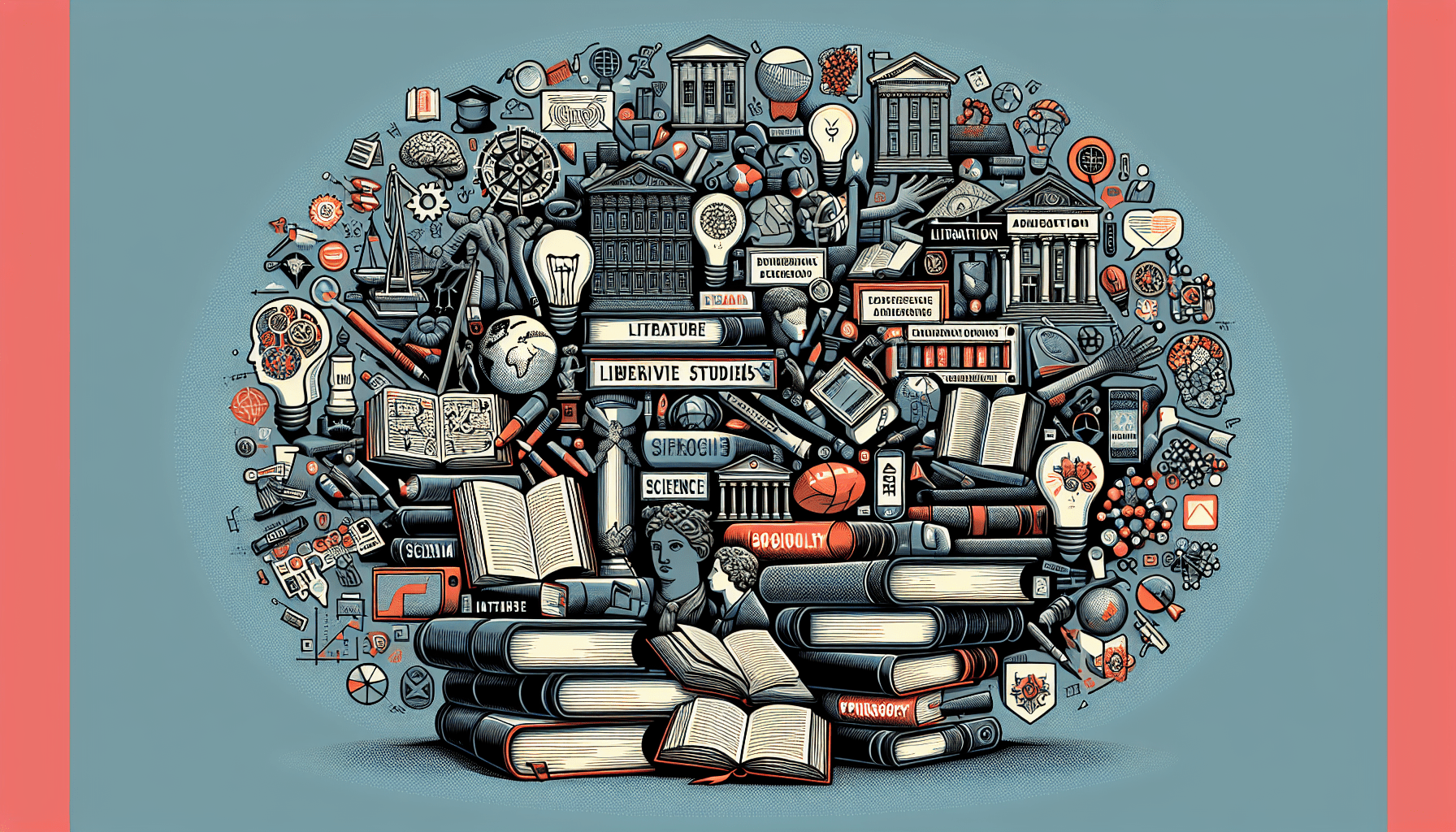A Bachelor’s Degree in Liberal Studies is an academic program that provides students with a comprehensive understanding of various disciplines within the liberal arts and sciences. This interdisciplinary approach encourages critical thinking, effective communication skills, and a well-rounded education. Through a combination of courses in areas such as literature, social sciences, humanities, natural sciences, and mathematics, students gain a broad knowledge base that prepares them for a wide range of careers or further studies in graduate school. With a focus on intellectual exploration and the cultivation of a versatile skill set, a Bachelor’s Degree in Liberal Studies equips individuals with the tools necessary to adapt to an ever-changing professional landscape.

What is a Bachelor’s Degree in Liberal Studies?
Definition and Overview
A Bachelor’s Degree in Liberal Studies is an undergraduate program that provides students with a broad and comprehensive education in various disciplines within the social sciences, humanities, natural sciences, and fine arts. It is designed to foster critical thinking, effective communication, research skills, and problem-solving abilities. This degree program encourages an interdisciplinary approach, allowing students to explore diverse subjects and perspectives. Liberal Studies emphasizes the development of transferable skills that are valuable in various career paths and further educational pursuits.
Interdisciplinary Approach
One defining feature of a Bachelor’s Degree in Liberal Studies is its interdisciplinary approach. Rather than specializing in a single field, students have the opportunity to study a wide range of subjects. This interdisciplinary approach exposes students to different methods of inquiry, enabling them to make connections between various disciplines. For example, a Liberal Studies student may take courses in history, literature, sociology, and biology, allowing them to gain a holistic understanding of a topic or issue. This interdisciplinary perspective fosters critical thinking and a broader understanding of the world.
General Education Requirements
Liberal Studies programs typically have general education requirements that ensure students receive a well-rounded education. These requirements often include courses in mathematics, natural sciences, social sciences, humanities, and fine arts. By taking courses in these different areas, students develop a breadth of knowledge and skills. This broad education serves as a foundation for more specialized studies in upper-level courses or for pursuing advanced degrees in specific disciplines.
Benefits of a Bachelor’s Degree in Liberal Studies
Flexible Career Paths
One of the key benefits of a Bachelor’s Degree in Liberal Studies is the flexibility it offers in terms of career paths. Graduates with this degree have a broad skill set that can be applied to various industries and sectors. They possess a strong foundation in critical thinking, communication, and problem-solving, which are highly sought after in today’s job market. This versatility allows Liberal Studies graduates to pursue careers in education, nonprofit organizations, government and public service, media and communication, business, and the corporate sector. The interdisciplinary nature of Liberal Studies prepares students to adapt to different work environments and contribute effectively across various domains.
Transferable Skills
Another advantage of earning a Bachelor’s Degree in Liberal Studies is the development of transferable skills. Throughout the program, students acquire skills such as critical thinking, effective communication, research and analysis, and problem-solving. These skills are applicable across different professions and are highly valued by employers. Whether graduates find themselves in education, business, or the nonprofit sector, these transferable skills enable them to excel in their chosen career. Liberal Studies graduates have the ability to think critically, communicate persuasively, and analyze complex issues, making them valuable assets in any workplace.
Preparation for Further Education
A Bachelor’s Degree in Liberal Studies also serves as a solid foundation for pursuing further education. Many Liberal Studies graduates choose to pursue advanced degrees in specialized areas such as law, education, social work, public administration, or business. The interdisciplinary nature of the degree program equips students with a broad knowledge base, which can be advantageous when applying for graduate programs. Furthermore, the critical thinking, research, and communication skills developed in a Liberal Studies program provide a solid foundation for success in graduate school.
Possible Majors and Concentrations in Liberal Studies
Humanities
Within a Bachelor’s Degree in Liberal Studies, students often have the opportunity to focus on a specific area within the humanities. They may choose to concentrate their studies in subjects such as literature, history, philosophy, or cultural studies. This concentration allows students to gain in-depth knowledge and expertise in their chosen field, while still benefiting from a broad-based liberal arts education.
Social Sciences
A concentration in the social sciences within a Liberal Studies program enables students to delve into disciplines such as sociology, psychology, anthropology, political science, or economics. This concentration provides an understanding of human behavior, societies, and the factors that shape them. A social sciences concentration allows students to explore issues such as social justice, policies, and the impact of human behavior on communities.
Natural Sciences
For students more inclined towards scientific inquiry, a natural sciences concentration can be pursued within a Liberal Studies program. This concentration may include courses in biology, chemistry, physics, environmental science, or astronomy. It provides students with a foundation in scientific principles and critical thinking skills necessary for understanding the natural world and environmental issues.
Fine Arts
A concentration in the fine arts within a Liberal Studies program allows students to explore various creative disciplines, such as visual arts, music, theater, or dance. This concentration fosters artistic expression, creativity, and the development of technical skills. Students have the opportunity to engage in artistic practice while also gaining an appreciation and understanding of the cultural and historical context of the arts.
Career Opportunities for Liberal Studies Graduates
Education and Teaching
One of the most common career paths for Liberal Studies graduates is education and teaching. With a broad knowledge base, graduates are well-equipped to teach a range of subjects in elementary schools, high schools, or community colleges. The critical thinking, communication, and research skills developed in a Liberal Studies program are essential for effective teaching. Additionally, graduates may choose to pursue further education and become professors or instructional coordinators in colleges and universities.
Nonprofit Organizations
Liberal Studies graduates are highly valued in nonprofit organizations due to their diverse skill set and interdisciplinary perspective. Their ability to think critically, communicate effectively, and understand complex social issues make them well-suited for roles in nonprofit management, program development, fundraising, and community outreach. By working in nonprofit organizations, graduates have the opportunity to make a positive impact on society and address pressing social issues.
Government and Public Service
A Bachelor’s Degree in Liberal Studies prepares graduates for careers in government and public service. The interdisciplinary nature of the degree program allows students to gain a comprehensive understanding of political systems, public policies, and societal issues. Graduates can pursue careers in areas such as policy analysis, public administration, advocacy, or diplomacy. They may work for local, state, or federal government agencies, as well as international organizations.
Media and Communication
With effective communication skills and a well-rounded understanding of society, Liberal Studies graduates are well-suited for careers in the media and communication industry. They possess the ability to analyze and interpret information critically, making them strong candidates for roles in journalism, public relations, advertising, or media production. Graduates may find themselves working for news organizations, publishing companies, advertising agencies, or in the realm of digital media.
Business and Corporate Sector
Liberal Studies graduates also find opportunities in the business and corporate sector. Employers value their critical thinking skills, adaptability, and ability to work well in diverse teams. Graduates may pursue careers in human resources, marketing, project management, or consulting. The interdisciplinary nature of Liberal Studies equips graduates with a broad knowledge base and the ability to understand complex business dynamics.

Skills Developed Through a Liberal Studies Degree
Critical Thinking
A Bachelor’s Degree in Liberal Studies fosters the development of critical thinking skills. Students are encouraged to analyze information, evaluate arguments, and think independently. Through exposure to diverse disciplines, students learn to approach problems from multiple perspectives and develop their own informed opinions. Critical thinking skills are highly valued in many professions, as they enable individuals to make sound judgments and effective decisions.
Effective Communication
Effective communication is a vital skill that Liberal Studies graduates acquire throughout their education. Through various writing assignments, presentations, and discussions, students learn how to articulate their thoughts clearly and persuasively. They also develop the ability to listen actively and engage in constructive dialogue. Effective communication skills are essential for success in any professional setting, as they facilitate collaboration, convey ideas, and build strong relationships.
Research and Analysis
Liberal Studies programs emphasize research and analysis skills. Students learn how to identify credible sources, gather information, and evaluate the validity and reliability of data. They are trained to conduct thorough research and to analyze complex issues critically. These skills enable graduates to make well-informed decisions, support their arguments with evidence, and delve into topics with depth and clarity.
Problem-Solving
Problem-solving is an integral skill developed through a Liberal Studies degree. By examining various disciplines and exploring different perspectives, students become adept at identifying and understanding complex problems. They learn to approach challenges with creativity and critical thinking, exploring multiple solutions and evaluating their potential outcomes. This problem-solving ability is valuable in various professional contexts, as graduates can navigate and address complex issues effectively.
Adaptability and Versatility
The interdisciplinary nature of Liberal Studies cultivates adaptability and versatility in graduates. Students are exposed to a broad range of subjects, enabling them to navigate different fields and adapt to diverse work environments. They develop the ability to learn and apply knowledge from different disciplines, making them adaptable problem solvers. This adaptability allows Liberal Studies graduates to thrive in dynamic and rapidly changing workplaces.
Challenges and Criticisms of Liberal Studies Degrees
Perception of Lack of Specialization
One challenge that liberal studies graduates may face is the perception of a lack of specialization. Since they do not specialize in a specific subject area, some employers or graduate schools may view their knowledge as broad but not deep. However, it is important to emphasize the transferable skills gained through a liberal studies degree and the ability to think critically and adapt to different contexts. Liberal studies graduates can also highlight their breadth of knowledge as an asset that allows them to bring a unique perspective to their work or studies.
Career Path Uncertainty
Another challenge for liberal studies graduates is uncertainty about their career paths. With a broad range of knowledge and skills, it can initially be challenging to identify specific career opportunities. However, by exploring different industries and networking with professionals in various fields, liberal studies graduates can discover the diverse job possibilities available to them. Furthermore, the versatility of their skills allows them to transition into different roles or industries as their interests and goals evolve.
Balance of Breadth and Depth
A criticism of liberal studies degrees is the potential imbalance between breadth and depth of knowledge. Some argue that the program may lack opportunities for in-depth study in a specific field. However, it is important to note that a liberal studies degree provides a solid foundation for further education or specialized training. Graduates can pursue advanced degrees or certifications in specific disciplines, building upon the broad knowledge they gained during their undergraduate studies.
Choosing a School and Program for Liberal Studies
Accreditation and Reputation
When choosing a school and program for a Bachelor’s Degree in Liberal Studies, it is crucial to consider accreditation and reputation. Accreditation ensures that a school meets certain standards of quality and academic rigor. Opting for an accredited institution ensures that your degree will be recognized by employers and other institutions. Additionally, researching the reputation of a school and program can help gauge the quality of education and the opportunities available to graduates.
Curriculum and Course Offerings
Evaluate the curriculum and course offerings when selecting a liberal studies program. Look for a program that offers a balance between general education requirements and opportunities for specialized study. Consider the diversity of courses available and the flexibility to tailor your studies to your interests and career goals. A curriculum that fosters critical thinking, effective communication, and interdisciplinary learning is essential for gaining a comprehensive liberal arts education.
Faculty and Resources
The qualifications and expertise of the faculty are crucial in a liberal studies program. Research the faculty members in the program you are considering to ensure they have a strong academic background and experience in their respective fields. Additionally, assess the availability of resources such as libraries, research facilities, and academic support services. A supportive and knowledgeable faculty, as well as access to relevant resources, contributes to a well-rounded education.
Internship and Study Abroad Opportunities
Internship and study abroad opportunities can greatly enhance a liberal studies education. Look for programs that offer internships or cooperative education experiences that allow students to gain practical, hands-on experience in their chosen field. Study abroad opportunities provide the chance to immerse oneself in another culture and expand global perspectives. These experiences can enrich education and offer invaluable networking and professional development opportunities.
Tips for Success in a Liberal Studies Program
Develop Clear Career Goals
To make the most of a Liberal Studies program, it is important to develop clear career goals and aspirations. Although the degree offers versatility, having a sense of direction can help tailor course selections and extracurricular activities to align with your interests and career path. Consider exploring internships or volunteering opportunities in various fields of interest to gain practical experience and confirm your career aspirations.
Take Advantage of Electives and Concentrations
Liberal Studies programs often offer a variety of elective courses and concentrations. Take advantage of these opportunities to tailor your education to your interests and goals. Consider selecting electives that complement and enhance your major or explore new subjects that pique your curiosity. Concentrations allow for more focused study within a specific discipline, allowing you to develop expertise and specialization while still benefiting from a liberal arts education.
Build a Strong Network
Networking is vital for success in any field. Attend career fairs, join professional organizations, and connect with alumni who have pursued careers in your areas of interest. Building a strong network can provide valuable insights, mentorship, and job opportunities. Liberal Studies graduates often find success through networking due to their ability to adapt and contribute in diverse settings.
Participate in Extracurricular Activities
Engaging in extracurricular activities can enhance your liberal studies education and provide valuable experiences outside of the classroom. Join clubs or student organizations related to your interests, participate in community service projects, or take on leadership roles. These activities can help develop teamwork, leadership, and time management skills, while also expanding your network and enriching your personal growth.
FAQs About Bachelor’s Degrees in Liberal Studies
Can I specialize in a specific area within Liberal Studies?
While a Bachelor’s Degree in Liberal Studies offers the opportunity to explore a range of subjects, some programs may provide concentrations or other options for specialization. These concentrations allow students to focus their studies on a specific area such as humanities, social sciences, natural sciences, or fine arts. By selecting electives within these concentrations, students can gain deeper knowledge and expertise in their chosen field while still benefiting from a broader liberal arts education.
What can I do with a Liberal Studies degree?
A Liberal Studies degree opens up diverse career opportunities across various industries and sectors. Graduates can pursue careers in education, nonprofit organizations, government and public service, media and communication, business, and the corporate sector, among others. The broad skill set and interdisciplinary perspective gained through a Liberal Studies degree provide a foundation for success in these fields. Additionally, the degree also serves as a stepping stone for further education and specialization in specific disciplines.
Will a Liberal Studies degree limit my job prospects?
While there may be some misconceptions around the perceived lack of specialization in a Liberal Studies degree, this degree actually offers versatile skills and knowledge that are highly valued by employers. The critical thinking, effective communication, and problem-solving skills developed through a Liberal Studies program are transferable across different industries and roles. Graduates possess adaptability and versatility, making them well-suited for a wide range of job prospects.
Is a Liberal Studies degree right for me?
Deciding whether a Liberal Studies degree is right for you depends on your individual goals, interests, and learning style. If you are someone who enjoys interdisciplinary learning, values a broad-based education, and desires a flexible career path, a Liberal Studies degree may be a good fit. It is important to assess your own career aspirations and consider how the skills developed in a Liberal Studies program align with your goals. Researching and exploring the various majors, concentrations, and career paths associated with Liberal Studies can help inform your decision.

